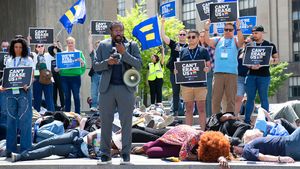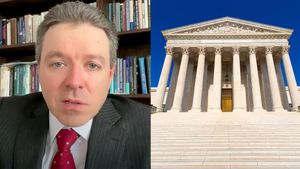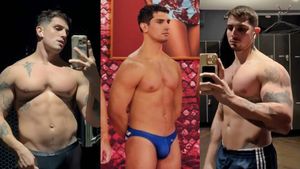Former Supreme Court Justice David Souter died Thursday at the age of 85. I clearly remember when he was nominated to the court in July of 1990. I was working on the Hill at the time, and President George H.W. Bush stood in the White House Rose Garden and introduced this little-known federal appeals court judge from New Hampshire.
One of the reasons I remember this so vividly is that he was replacing a retiring liberal lion, Justice William Brennan, and like every other liberal at the time, I was upset. Brennan was the soul of progressive jurisprudence, a champion of civil liberties, and now he was being replaced by someone whose record was thin at best.
There was no way that Souter could fill the giant shoes of Brennan. Conservatives, meanwhile, were over the moon. The National Review crowd all but danced on First Street in front of the court building, calling Souter a “home run.”
And for a moment, that’s what it looked like. Souter was a Republican appointee, a New England Yankee who had clerked for the conservative Justice John Harlan and served as New Hampshire’s attorney general.
Personally, he was as old-fashioned as he could be, buttoned-up, professorial, famously bookish, so much so that his bachelorhood and the fact that he lived with his mother well into adulthood raised a few eyebrows.
At the time of his nomination, the Orlando Sentineltook a very unfair shot at Souter, questioning, “We wonder, ‘What’s wrong with him? How does he feel about women? Is he anti-social, homosexual, misogynistic, immature or just plain dweeby?’ “
However, back then, a single man with a passion for solitude, history, and what amounted to a 19th-century legal theory mind might just be labeled “eccentric.” And that’s how Souter was widely understood. He was more like a cerebral oddball, a scholar, perhaps too thoughtful for his own good.
But what happened next stunned everyone. Almost as if a switch had flipped, Justice Souter became a steady and deeply principled voice on the court’s liberal wing. The same conservatives who had toasted his appointment now viewed him with disdain. I remember how fast it happened. It wasn’t gradual; it was tectonic.
He shifted from out underneath the Republican Party like an earthquake, and the magnitude 9 on the Richter scale was his vote onPlanned Parenthood v. Caseyin 1992. This was a case I was intimately familiar with. Casey was Pennsylvania Gov. Bob Casey, who I knew in a roundabout way, because my last name is Casey, and I worked for a Pennsylvania congressman. Both he and Casey were against abortion rights, so anti-abortion forces assumed at the time that Souter would be a reliable vote for Casey. He was not.
Instead, Souter coauthored the opinion that reaffirmed the core holding of Roe v. Wade, delivering a blow to the anti-abortion movement that had thought him one of their own. In Lee v. Weisman in 1992, he helped prohibit school-sponsored prayer at public school graduations, strengthening the wall between church and state. Imagine that happening today? Hell no!
In Boumediene v. Bush in 2008, he sided with detainees at Guantanamo Bay, asserting their constitutional right to habeas corpus. Again, I bring this up because today’s heinous court voted to allow Donald Trump to deport alleged migrant gang members largely without due process. Souter would have surely thought that was illegal — well, because it is!
By the end of his tenure, Souter had come to stand for judicial restraint as well as liberal pragmatism and constitutional humility. In other words, Souter’s motto could have been “not so fast.” He was cautious to a fault. For Republicans, he was one big fault and a huge regret. The wound he left was so deep that when George W. Bush sought to fill a Supreme Court vacancy, his aides reportedly advised him not to pick another Souter.
Of course, because of all the mayhem he caused, Souter’s life outside the courtroom came under examination. Souter was equally mysterious in his personal life, and endlessly dissected, and surprisingly mostly by Republicans who were repulsed by him.
He famously disliked Washington. As someone who worked on the Hill at the time, I’d often see justices out at receptions (I met Justice Byron White once and was in awe because he played football) or legal lectures (I sat in the front row of one listening to Justice Sandra Day O’Connor), and even at my gym. I dressed and showered next to Justice Antonin Scalia on many mornings after he played racquetball, usually with Pennsylvania Republican Sen. Arlen Specter.
But I never saw Souter. He loathed the spotlight. He read voraciously. He hiked in solitude. And when he retired at the relatively young age of 69, he did what few justices ever do: He vanished. He moved back to New Hampshire, a farmhouse, and by most accounts, returned to the reclusive lifestyle he’d always preferred.
It was around the early '90s, though, when the whispers began. Souter was unmarried. He was close to his mother. He didn’t date. He avoided society. Some of the whisperers weren’t content with speculation. They indulged in cruelty. I had friends working for Congressman and then Senator Rick Santorum who hated Souter.
On many nights, while drinking heavily, they derided him derogatorily and referred to Souter as a “mommy’s boy,” and occasionally used a gay slur to impugn his masculinity and sexuality. It was disgraceful, but because I was in the closet, I begrudgingly went along with it
Years later, televangelist Pat Robertson, still stewing over Souter’s role in Casey, described Souter as “a disaster” and insinuated that he was gay, as though that were some kind of moral failing. It was grotesque.
The truth is, no one knew Justice Souter’s private life, and no one was owed that knowledge. As a gay man myself, coming of age at the time, and working on the Hill, with so few public figures to look up to, I remember clinging to every detail about him. Was he like me? Could someone like me occupy such a place of power?
I’m sure I wasn’t the only young gay man feeling this way.
Souter did on occasion, though, hint at some support for the LGBTQ+ community. He joined the 6-3 majority in Lawrence v. Texasthat struck down all remaining sodomy laws. Souter quietly but decisively helped dismantle one of the most entrenched legal weapons used to criminalize and dehumanize LGBTQ+ Americans.
And it was in his cautious signals, rather than explicit declarations, that Souter’s evolving understanding of LGBTQ+ rights became most intriguing. In 2009, after retiring, he appeared to suggest that the court, and the country, should move with care (which was in keeping with his cautiousness) but conviction on marriage equality, hinting at an openness that would soon come to fruition in later rulings, namely in the 2015 case ofObergefell v. Hodges.
I remember reading Robert Draper's GQ profile about Souter in 2009 with particular interest. Draper explained that Souter wasn’t a culture warrior or some sort of icon. Instead, he was a thinker moved not by ideology but by his complex and quiet life.
Draper went on to say that Souter’s opinions were shaped by long walks and longer reflections, suggesting an empathy for those long written out of constitutional protection. That empathy, in the end, became a force in helping to reshape the legal landscape for LGBTQ+ Americans.
What’s undeniable is that Souter’s legacy is a big paradox. He was appointed to bolster the conservative voice on the bench and instead became a progressive counterweight. He was never flashy, never political, never a headline-seeker.
In a political system addicted to performance, he was the antithesis, an anti-performer. In an institution surrounded by egos. Personally, I can attest to the giant of ego of the racquetball swatting Scalia.
Souter appeared to be ego-less. And, in a society during his later years on the bench that was becoming increasingly open via social media, Souter remained a dignified mystery. And maybe that’s part of what made him so admirable, and perhaps the main reason that he exited the stage so early.
I will admit to long admiring Souter. I remember a few years ago trying to find an autobiography by him because I wanted to learn more about who he really was. Obviously he didn’t write one, so I read the only biography written about him, and truth be told, I didn’t learn much more than I already knew.
Souter may have retreated from the public eye, but his legacy persists, not just in the decisions he joined but in the quietness he brought to the bench. He remains the great enigma of the Supreme Court. He’s a man who said little, revealed less, but did his part to help shape the conscience of the law.
Voices is dedicated to featuring a wide range of inspiring personal stories and impactful opinions from the LGBTQ+ community and its allies. Visit Advocate.com/submit to learn more about submission guidelines. Views expressed in Voices stories are those of the guest writers, columnists, and editors, and do not directly represent the views of The Advocate or our parent company, equalpride.














































































